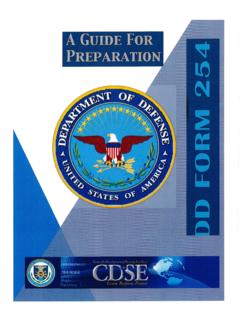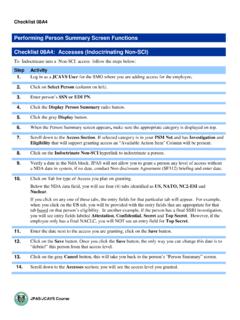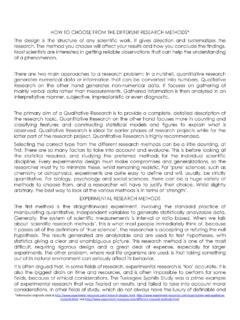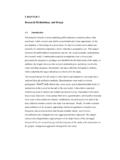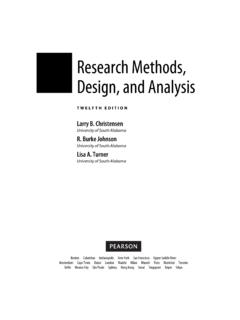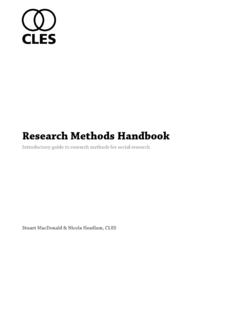Transcription of Sample Course Syllabus for Research Methods, …
1 * Sample Syllabus is subject to change each semester. Research methods , Data Analysis, and Reporting to Support DoD Security Programs (CDSE ED 508) Defense Security Service (DSS) Center for Development of Security Excellence (CDSE) Education Division Sample Course Syllabus * 1. Course Description/Overview The main purpose of the Research methods , Data Analyisis, and Reporting to Support DoD Security Programs Course is to introduce students to quantitative and qualitative methods for conducting meaningful inquiry and Research . They will gain an overview of Research intent and design, methodology and technique, format and presentation, and data management and analysis informed by commonly used statistical methods . The Course will develop each student s ability to use this knowledge to become more effective as security leaders in the DoD. These tasks include: Developing a hypothesis, a Research problem and related questions Framing the problem with the correct Research methodology Collecting data that accurately addresses the Research problem Measuring the effectiveness of a program Using data to make decisions Providing technical guidance to contractors for inclusion in contract documents related to Research projects Evaluating feasibility of Research proposals Presenting data to support programs to decision makers and other consumers The Course will provide an overview of the important concepts of Research design, data collection, statistical and interpretative analysis, and final report presentation.
2 The focus of this Course is not on mastery of statistics but on the ability to use Research in the DoD Security environment. Each week students will work through lessons that present security-specific readings and Research and/or statistics-related concepts that bring to life examples of how the weekly topic applies to security. This will allow students to clearly understand how the Course material relates to their jobs as security professionals. 2. Target Audience/Prerequisites The target audience for this Course is DoD civilian and military defense security professionals from a variety of specializations. This Course is designed at the collegiate level. This Course has no prerequisites. 3. Student Outcomes/Objectives This Course will be designed to enable students to meet the following final terminal learning objectives: Act as an educated consumer of data Prepare a preliminary Research design for projects in their subject matter areas Accurately collect, analyze and report data Present complex data or situations clearly Review and analyze Research findings that affect their agency 4.
3 Delivery methods / Course Requirements This is a graduate-level distance-learning Course in Research methods and statistics for security professionals. The Course will consist of readings and presentations, participation in the discussion forum, exercises, and written assignments. The assigned Course readings draw from a variety of resources, such as DoD and GAO reports, articles and essays on Research methods , and examples of effective and ineffective presentation of statistical information. Students are expected to familiarize themselves with the assigned topic and readings each week and should be prepared to participate in the online discussion forum to discuss the readings critically. 5. General Course Requirements Class participation is both important and required. If, due to an emergency, students are not able to respond to a discussion prompt in the week it is assigned, they must contact the instructor by e-mail and will be expected to post their response in the following week.
4 It is expected that assignments will be submitted on time (by midnight the day they are due). However, it is recognized that students occasionally have serious problems that prevent work completion. If such a dilemma arises, students should contact the instructor in a timely fashion. The completion of all readings assigned for the Course is assumed. Since the class will be structured around discussion, completion of readings and all class assignments is crucial. 6. Academic Integrity Please refer to CDSE s Academic Integrity Policy for guidance on adhering to their high standards of academic integrity and security. You must acknowledge that you have read the CDSE policy by posting to the appropriate discussion Forum in Sakai, where you will find a copy of this policy. You will be held to these standards for every writing assignment you submit for this Course . 7. Grading / Assignments The following provides an approximate breakdown of how each assignment contributes to the overall performance in the class.
5 Class Participation 20% Weekly Assignments (ten) 40% Mock RFP 15% Final Research Project 25% Class Participation (20%): The participation grade includes active engagement in the class discussion forum, and conducting peer reviews. The discussion forums are a rich way to enhance the online learning experience, however success depends on participation. Discussions include both student-instructor and student-student interactions. Please respond to other students prompts and propose discussion points as this is a chance to share your knowledge and experience. For many weeks there are two discussion forums: 1. Based on a question posed by the instructor 2. Based on a security-focused article Students must post at least two peer responses each week one to each forum topic as appropriate or to two different students if only one topic is required The purpose of the discussion is to increase students understanding of the material and demonstrate their ability to complete and comprehend the readings.
6 To achieve full credit for participation, students must respond thoughtfully to all weekly discussion prompts, post a response in both discussion forums, and write in full and complete sentences in the discussion forum. The participation grade will also include the peer review of the final paper. To achieve full credit, provide constructive criticism when conducting peer reviews of other students work. Students are expected to participate in supportive, collegial discussion in the classroom. Weekly Assignments (40%): Weekly assignments include forum discussions and small-scale exercises aimed at helping students to apply the weekly lesson objectives. The time burden for each assignment is not expected to exceed two hours per week. Mock Request for Proposal (RFP) (15%): The first major written assignment is to prepare the technical section of a request for proposal for a Research project or statistical data collection. The students should address procedures for collecting, analyzing, and reporting the data.
7 The RFP should include a Sample design, data collection method, data description, and if required, statistical analysis technique employed. The Mock RFP should be 3-5 pages in length. Final Research Paper (25%): The final Research paper requires students to write a report for decision-makers and other Research topics should be on a security-related issue for which the students have access to statistical data. Exploring a current workplace problem throughout the Course would be extremely beneficial. Potential topics include: trends in violations, serious security incidents, financial reports, and proposals for new programs or policies. Prior approval of the topic for the final Research paper is required. Students will Research the topic thoroughly in order to fully explore and analyze the varying perspectives regarding the selected issue. They must then formulate their own recommendations for resolution of the issue, including justifications and specific strategies for implementation of the recommendations.
8 Students will properly cite all Research referenced in the report, using the format laid out in the Chicago Manual of Style. The paper is expected to be between 20 and 25 pages in length, including front and back matter. Sections of the paper will be developed throughout the Course . Students must have a draft of the report at least 75% complete and ready for peer review by another student by Week 13. During Week 14, students will review each other s reports and provide constructive criticism. Students will have the remainder of the semester to complete the report. The Final Report is due at the end of the semester. A rubric for the grading process is included at the end of the Syllabus . 8. Course Feedback The Course instructor will provide multiple opportunities for students to provide constructive feedback on Course delivery and content over the period of the Course . Additionally, students will provide feedback on one another s work through posts in the discussion forum and formal peer reviews of identified writing assignments.
9 Finally, the instructor will provide written feedback to students on all assignments. 9. Course Textbooks There is one textbook required for this Course . Additional readings will include academic papers and DoD reports. The text is: John Creswell Research Design: Qualitative, Quantitative, and Mixed methods Approaches Paperback: 304 pages Publisher: SAGE Publications, Inc; Fourth Edition (March 14, 2013) Language: English ISBN-10: 1452226105 ISBN-13: 978-145222610 10. Course Outline The Course is divided into six topic areas: Part 1: Introduction and Basic Research Concepts ( 2 weeks) Part 2: Qualitative Research methods (2 weeks) Part 3: Quantitative Research methods and Statistics (6 weeks) Part 4: Mixed methods Research (1 week) Part 5: Reporting Results of Data Analysis (3 weeks) Part 6: Completing the Research Project (2 weeks) The following table outlines the 16-week Course agenda and the exercises and assignments.
10 Students will additionally participate in weekly discussion forums, which are not noted here. Lesson/ Week Topics Student Assignments Due 1 Introduction to The Process of Conducting Research Due: Introduction forum Acknowledge CDSE Integrity Policy Forum 1a: Research in DoD Forum 1b: Article Review 2 Research Design Introduction Steps in the Process of Research Identifying a hypothesis and/or Research problem, specifying a purpose, creating Research questions Reviewing literature Ethics of Research and informed consent Due: Forum 2a: Research Designs in DoD Forum 2b: Article Review Exercise 1: Identifying Research Designs and Creating Hypotheses (Note: Submit proposed final Research project topic to instructor during Week 2) 3 Introduction to Qualitative Research Essence of Qualitative Data Sampling Collection Techniques o Biography o Phenomenology o Grounded Theory o Ethnography o Case Study Due: Forum 3a: Components of Qualitative Research Forum 3b.
